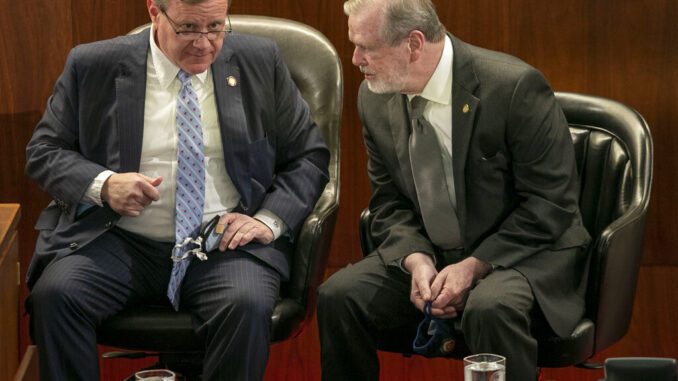
RALEIGH — North Carolina House and Senate budget-writers are close to completing their work on proposed adjustments to the second year of a two-year state spending plan approved last fall, top Republican legislators said Tuesday.
House Speaker Tim Moore and Senate leader Phil Berger separately told reporters they anticipate meeting later this week to negotiate differences over adjustments that the appropriations committee leaders could not bridge.
“So hopefully by … next week we’ll have something for folks to vote on,” Berger said.
Republicans, who control both chambers, have been deciding what to do with $6.2 billion in projected revenues above and beyond what they anticipated state government would receive this fiscal year and the next year that begins July 1. The enacted budget already tells state government how to spend about $27 billion for the next 12 months.
Moore said an agreement had been reached on additional salary changes, while Berger said he expected some kind of tax reduction. Details weren’t disclosed. Moore said last week he expected a large amount of money would be earmarked to ensure state construction projects had enough cash to be completed despite inflation.
Policy changes usually also are included in the budget adjustment bill, which would require affirmative House and Senate votes before it heads to Democratic Gov. Roy Cooper’s desk.
Berger and Moore said they expected to speak with Cooper before moving forward on votes. They are hopeful that Cooper, who offered his own proposed budget adjustments, will sign their plan into law.
With an enacted budget already in place, Republican lawmakers sound less inclined to work out a replacement plan should Cooper veto the proposal. Republican leaders have said they are aiming to adjourn this year’s work session around July 1.
Berger said he’d still like to see the compromise product contain the state’s acceptance of federal money to expand Medicaid to hundreds of thousands of additional low-income adults. But many House Republicans remain skeptical of Medicaid, expansion, and Moore has said repeatedly there’s isn’t time to address it during this session.
Berger recently reversed his position on expansion after opposing it ardently for years. He advanced through his chamber late last month l egislation that contained expansion and other health care items. Cooper is a strong Medicaid expansion supporter, too.
“I think it’s something that ought to be in the budget,” Berger said, and “let’s see if we can reach an agreement.”



